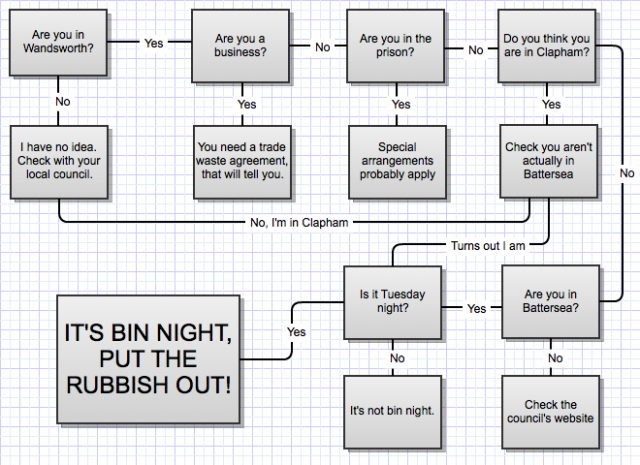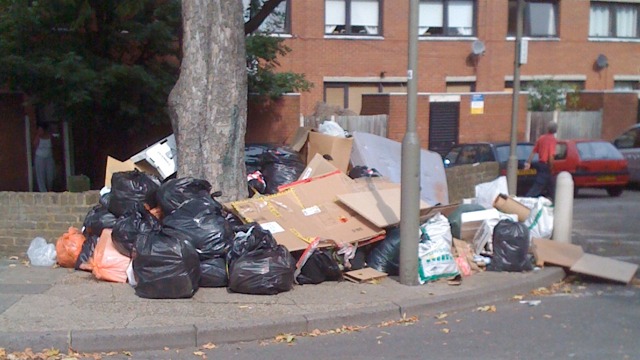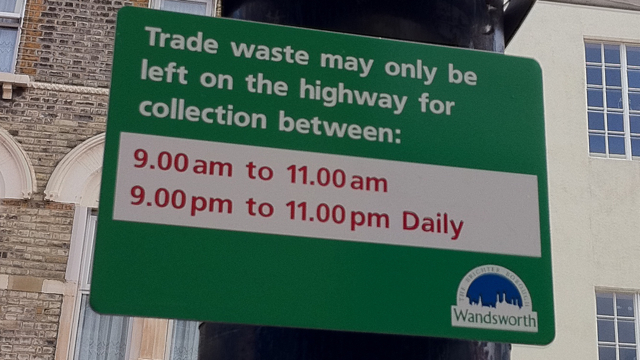
Although Wandsworth’s new refuse collection contract isn’t that new any more, some people are still getting caught out. This handy flowchart will help you work out if it’s bin night or not (click the picture for a marginally larger version)
If you haven’t noticed (and I fear many haven’t) the council’s refuse collections are changing from next week.
The changes are a result of the council’s new collection contract. Many of the changes will not directly affect residents. Those that will include changing the collection method, so general waste and recycling can be taken together (meaning you won’t see the recycling linger after the rest has been collected), the return of garden waste collection (so you don’t have to either pay or take it to the tip yourself) and Putney residents will no longer be woken by a collection on a Saturday morning.
And that will result in the biggest change, since now the whole borough will be collected over five days (from Monday to Friday) instead of over six days (from Monday to Saturday).
Obviously it isn’t possible to lose Saturday collections in Putney without rejigging collections elsewhere, the effect is different from place to place but in Shaftesbury collection day changes from Thursday to Wednesday.
Extra resources are being put in place for the transition period, since there will inevitably be confusion to begin, but obviously the more people who get it right from the start the easier that transition will be: not least because many people rely on the ‘nudge’ of seeing their neighbours putting out rubbish to remind them to put out their own.
You can find out your new collection day on the council’s website.
Happy New Year.
And a reminder, now that twelfth night is approaching, that the council is once again recycling Christmas trees.
On normal collection days from tomorrow (5 January) until 18 January trees will be collected free of charge, then shredded to become compost.
It’s impossible not to notice trees starting to litter the streets, they should only be put out the evening before collection, and even then not on the street unless there is no other option – the council will collect trees (and your normal rubbish and recycling) from your front garden so there’s never any need to block the pavement.

Several weeks ago I posed the question does the council actually hinder people doing the right thing? The example offered publicly in the comments (and by email from someone else) was on our policy of charging to collect bulky items.
I’ve never been directly involved in our refuse policy. But I’m not afraid of idly speculating to cover my ignorance, so I’ll carry on regardless.
Obviously the council is aware that by charging, we run the risk of people fly tipping. There is, to use the economic term, price elasticity. Some people won’t pay, and will fly tip whatever the price (and some even if it were free). Most people will pay if it’s a reasonable amount, but as the fee increases so does the proportion of people who will just dump their rubbish illegally. The judgment is where that price covers the cost of the service (or as much as possible) without seeing the income wiped out by increased fly tipping.
But moving on from the charge, I think there are valid points in the comment about the complex rules surrounding waste collection:
Now does the previous owner’s dismantled desk that they left in our cellar count as 1 piece of furniture, or should i saw it up into 3 standard sized sacks? And if i did would they still weigh less than 25kg and how would I even know? What about the spare kitchen cabinet panels, scraps of carpet or broken pane of glass? It makes my head hurt!
Wouldn’t 1 fee be easier? Or small/medium/large collection fee? Or 1-yearly free collection?
Also when people try to do the right thing and then can’t find the information they’re looking for on the council website because it’s rubbish, I’d say that stops good behaviour.
It is, I think, a consequence of a bureaucracy (a word I always use neutrally) that it is rule-bound and, therefore, tends to think everyone and thing else is rule-bound. What’s the betting those rules are there because there restrictions on lifting heavy items? So, we have to protect our staff and contractors from potential injury and do that by passing on the rule to the resident, never thinking that many people have no way of weighing heavy items.
Going further, I wonder why we are even collecting a lot of bulky items. When we tried to dispose of a fridge we paid the bulky collection fee only for someone to steal it from our garden the day before collection. I know the fridge itself had no value as a fridge (I’d even managed to pull one of the doors off when removing it) so can only guess it had some scrap value. Why aren’t we investigating whether scrap merchants would consider taking on some of these collections for us? Or charities? Despite frowning on their use of chuggers the British Heart Foundation in Wandsworth will collect furniture and electrical items for resale in their shops.
However, when you look at the council’s page on using others it manages to contain, within five bullet-points, two references to prosecution, the need to check (with another agency) waste collection registration and the potential need for advance authorisation to take things to the tip. Not something that encourages alternative disposal methods!
And finally, I sometimes wonder if we are too good at clearing up. There are a few fly tipping hot-spots in my patch and, speaking to officers, discovered that, at times, they collect daily from them. But what impact does this have? Residents might appreciate the clean streets, they might be impressed that the dumping they see in the morning removed by the evening. But might they also think that next time they have something they need to get rid of there’s an easy route? Some might not even realise it isn’t a legitimate service!
I once suggested that we just stop collecting for a week, to see what happens. We’d tell everyone that’s what we were doing, and then use the accumulated rubbish as an example: it isn’t just for the council to remove the rubbish, it’s also for people to stop dumping it, and pass on information when they see others doing it.
Increasingly I’m seeing the way the council should operate is not as a service provider, but as a party to a contract. In this example, we agree to keep the streets as tidy as we can, and residents agree not to dump rubbish and help us find those that do. We could even bring in others, like the BHF, to play their part and give them opportunity to raise money. There are huge areas of life where residents, business and charities, as well as the council, all could have a role to play if we moved away from a simple service delivery model and towards a mature relationship where we all recognised the part we play, effectively a Wandsworth contract. Would you sign it?
 The system, which has already been introduced to Tooting and Balham town centres is fairly straight-forward – basically businesses will need to fulfil their legal duty to have a trade waste agreement (it’s amazing how many businesses don’t, leaving the council to collect their illegally dumped rubbish) and will only be allowed to dump their rubbish during two defined, two-hour slots – one during the day and one during the evening.
The system, which has already been introduced to Tooting and Balham town centres is fairly straight-forward – basically businesses will need to fulfil their legal duty to have a trade waste agreement (it’s amazing how many businesses don’t, leaving the council to collect their illegally dumped rubbish) and will only be allowed to dump their rubbish during two defined, two-hour slots – one during the day and one during the evening.
The system is remarkably simple but, I think, something of an innovation. It really cuts down on the amount of rubbish on streets by helping minimise the time from it being put out to being collected.
It’s made a huge difference to Tooting and Balham’s streets, and the council has learnt from the implementation in both, so it hopefully won’t be long until it’s making a difference in Clapham Junction as well.
I’ll confess I’m finding the bad weather a little tedious.
There are a few reasons for this. First, the fact that it gets cold every year in this country really shouldn’t be a lead news item for days on end – but somehow it is. Second, it makes me talk about it so I become tedious.
I’m also always a little disappointed by it. Yesterday morning I was in Westminster for a meeting and it looked beautiful. But a few hours later, as the snow stopped, the roads and pavements turned into a dirty slush and the white crowns on Westminster Abbey and the Palace of Westminster started to melt and fade it just became a bit cold and miserable. I’m not sure if the few hours of picture postcard scenery made the cold, wet walk I then had to take up to Victoria Street worthwhile. But maybe I’m just a misery by nature.
It also impacts on the council’s services, and it’s hard for the council to meet the expectation that everything will work as normal. However, it almost managed. The main victim yesterday was refuse collection – made worse because the same collection last week was the first hit by the heavy snow and a small number (around twenty) were missed for a second week (given that many boroughs just cancelled last week’s collections altogether Wandsworth has done a good job to minimise the disruption). Many of those, however, are from housing estates, and therefore the refuse is in designated refuse areas rather than people’s homes or gardens.
Refuse collection is back to normal today and teams are also working on clearing back log, so the twenty or so missed collections should be caught up this week.
…well, not at all really but last night’s Environment and Leisure Committee considered a report on a trial of pyrolysis in two of our council blocks.
I’m slightly surprised this hasn’t seen more coverage (as far as I’m aware it’s never been reported outside of the council’s formal meetings) since it’s a fairly innovative way of dealing with household waste – although apparently it’s been used on submarines for years.
Pyrolysis, essentially (and unscientifically) is burning without oxygen so there is no fire. The process creates a dust that can be washed away with waste water through the drains. Remaining items, like glass and metal can be recycled. This has potentially huge environmental benefits, from reducing the number of refuse vehicles on the road, through to minimising the amount of landfill needed.
The two test sites were a success, proving that it is a viable technology but identifying a few problems or issues that need to be resolved. It’s now for the manufacturer, PyroPure, to go away and work up their prototypes into a commercial product.
If your New Year’s Resolution was to read more council reports the latest update is contained within the agenda to last night’s meeting.
Well, hopefully they are recycled.
The council has been offering a recycling scheme for Christmas trees for several years and this year is no different – from tomorrow (7 January) you can leave your (real) Christmas tree out with your refuse on your usual collection day. It will be collected, shredded and used for composting.